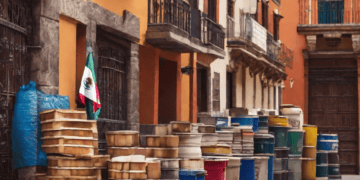Introduction: When it comes to importing and exporting goods, understanding the nuances of customs brokerage in different countries is essential. This article sheds light on the divergent practices between Mexico and the United States, offering insights for businesses navigating international trade.
Importing Into the United States: Becoming a U.S. customs broker involves a process administered by the U.S. Customs and Border Protection (CBP), including an application, an exam, and a background check. These brokers often specialize in specific goods and can file remotely through the Automated Broker Interface (ABI) at various entry points, eliminating the need for proximity to specific locations.
Compliance responsibility is a shared venture between the U.S. Department of Homeland Security, importers of record (IOR), and customs brokers. Errors in filings hold both the importer and broker accountable for penalties. Importers don’t require a physical presence in the U.S.; they establish themselves, often with a broker’s assistance, as foreign importers of record and must maintain a customs bond.
Importing Into Mexico: In Mexico, customs brokerage historically followed a hereditary licensing system, though this is gradually changing. The country has around 800 licensed brokers who mainly operate at four principal ports and often specialize in specific commodities. Unlike the U.S., customs brokers from other countries cannot enter goods into Mexico.
Responsibility for compliance primarily rests on licensed customs brokers in Mexico, who face significant liability for accuracy in declarations, especially regarding tax collection, notably the 16% flat value-added tax. Only registered Mexican companies can participate in international trade for imports into Mexico, as Mexico does not recognize foreign importers.
Choosing the Right Customs Broker: Selecting a customs broker in either country requires thorough consideration. It’s essential to seek straightforward answers, proactive advice, and avoid unrealistic promises. A competent broker should ask pertinent questions and prioritize high-quality filings. Collaboration with a knowledgeable global customs broker helps in crafting creative and cost-effective solutions tailored to business needs.
Conclusion: Understanding the contrasting customs brokerage practices between Mexico and the United States is crucial for businesses engaged in international trade. Selecting a trustworthy customs broker who understands compliance nuances and aligns with business objectives is pivotal for success in navigating diverse customs environments.
Stay current with supply chain report news at The Supply Chain Report. For international trade resources, visit ADAMftd.com.
#CustomsBrokerage #MexicoCustoms #USCustoms #InternationalTrade #ImportingToUS #ImportingToMexico #CustomsBroker #USCBP #DHS #ComplianceMatters #TaxCollection #ValueAddedTax #BrokerSelection #TradeCompliance #CustomsImport #CrossBorderTrade #GlobalBusiness #TradeSolutions #SupplyChainManagement #CustomsExpertise #BusinessLogistics















